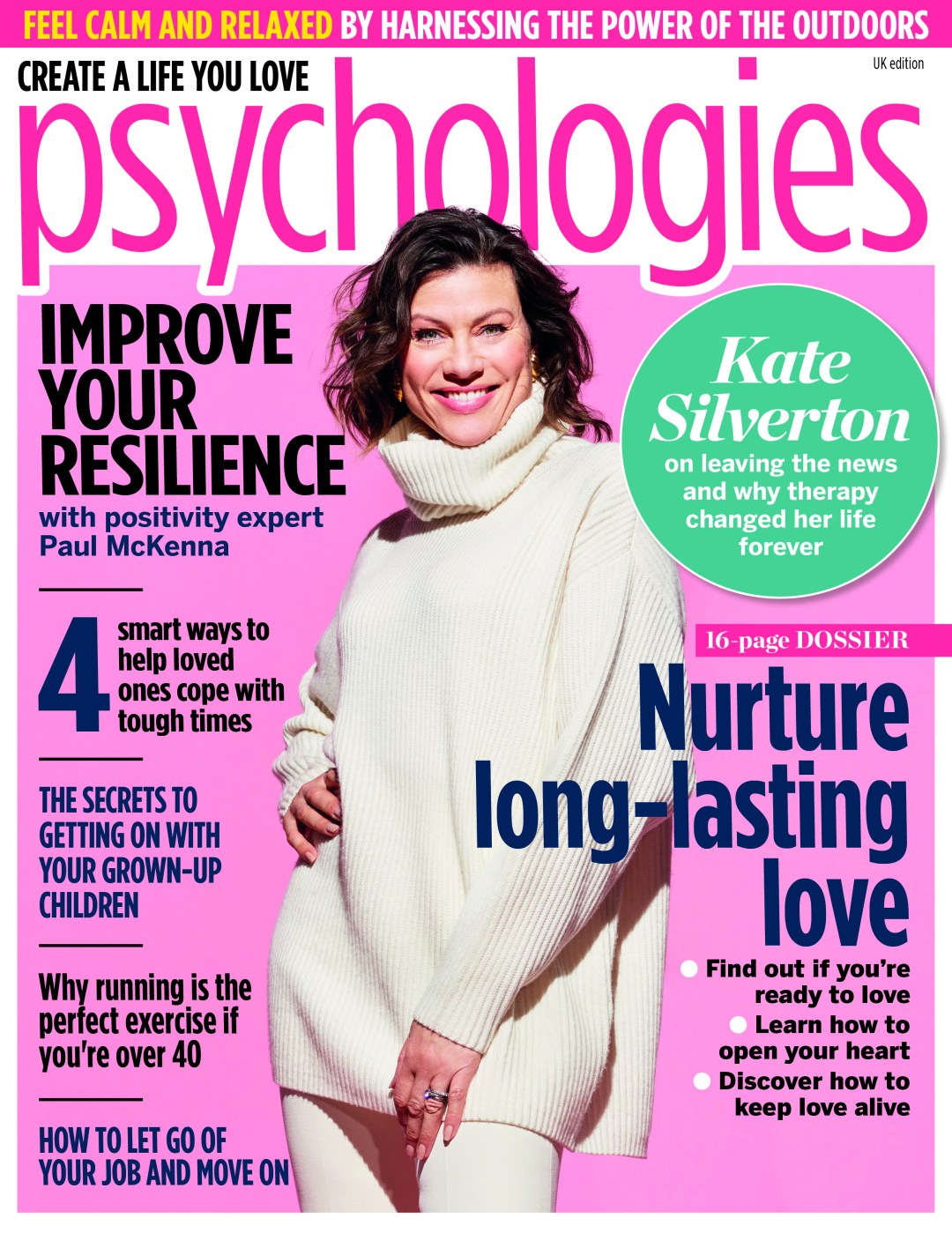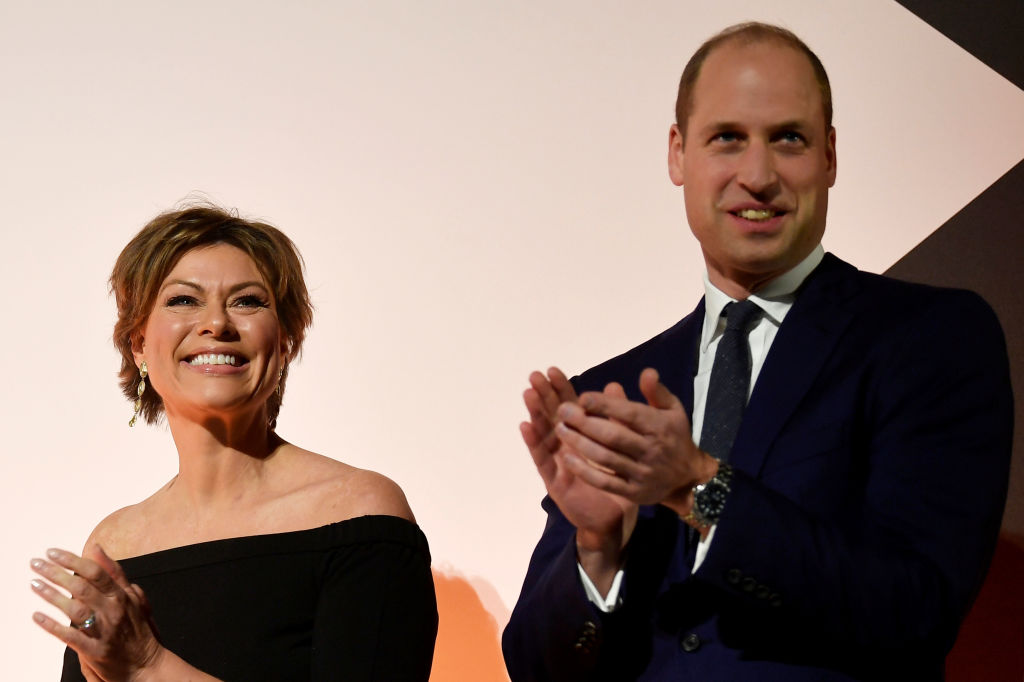‘Therapy helps us live in multicolour’: Kate Silverton reveals why she’s gone from interviewing Clint Eastwood to counselling children
The former journalist and BBC News anchor Kate Silverton credits psychotherapy with changing her life. Now she is embarking on a new career as a child therapist, helping families improve their mental health and relationships

Throwing everything up in the air and changing career is never easy, but when your professional highlights include interviewing Clint Eastwood, Cate Blanchett and Dame Helen Mirren, working with the Duke of Cambridge and appearing on our TV screens for more than 20 years, it’s perhaps harder still. Nevertheless Kate Silverton has no regrets about leaving journalism and dedicating herself to helping young people and their parents.
Last summer, shortly after releasing her debut parenting guide, There’s No Such Thing As ‘Naughty’, she stepped down from news presenting to concentrate on counselling primary and secondary-age schoolchildren as part of her training to become a qualified child therapist. By the time this interview is published, Silverton will ‘be very much ensconced’ in her new profession, just weeks away from completing a post-graduate diploma in child counselling and one step closer to achieving her dream: opening her own private counselling practice to help youngsters and their parents.
‘The Japanese have a wonderful concept called ikigai, which means “life purpose”. Doing something you love is shown to improve life expectancy, so you should always make sure you’re not running away from something, as in “I hate my job”, and running towards something you’re passionate about instead,’ says Silverton. ‘Go towards something that nurtures and fulfils you, because life is not for us to endure, it is for us to enjoy. Once you make that step, providence will follow,’ she adds. ‘I’ve been planning this [pivot] for quite some time. ‘I’ve always followed my heart and asked “Where is my passion?” and, actually, journalism is quite similar to psychotherapy, because you’re asking questions and being curious. I’ve loved having a career that has been so multifaceted and fulfilling,’ she adds. ‘I’ve reported from the frontline in Iraq and Afghanistan, and from the red carpet at the Oscars.’
As most memorable moments go, producing a BBC documentary with the Duke of Cambridge about rhino poaching tops the lot. In June 2012, Silverton and Prince William spent an afternoon together at a wildlife park in Kent, discussing Africa’s illegal rhino trade and the role the prince wanted to play in ‘effecting international change’. Silverton, who had recently become a mother for the first time with her daughter, Clemency, had taken her six-month-old to filming. ‘The duke took great interest in her,’ recalls Silverton. ‘I have a lovely photo of her reaching out to him and him laughing.’
Now, a decade later, it’s Silverton who children are reaching out to for help. It’s an inspiring professional about-turn for Silverton, who studied child psychology at Durham University and worked for a bank before being hired as a regional BBC reporter in the north. She climbed the ladder to become one of the country’s best-loved prime-time news anchors then, in 2018, after a two-year period of maternity leave and appearing on the sixteenth series of Strictly Come Dancing, she began her training in psychotherapy.

Growing up in Waltham Abbey, Essex, Silverton describes herself as an ‘adventurous and curious’ child who was inspired to venture into the unknown by her late father, Terry, a London cabbie turned hypnotherapist, who taught her to ‘live life large and dream big’. In her blog, Silverton movingly recalls sitting in a hospice beside her dad in 2015, shortly before he died from cancer.
‘He turned to me and told me how proud he was of me,’ she writes. ‘He had taught his daughters they could achieve anything in life by working hard enough. “Hard work works” he’d say. How lucky I was to be able to show my dad that it was his example I had indeed followed.’
A junior swimming champion at nine, five years later Silverton became the youngest in her county to achieve the The Queen’s Guide award – the highest attainable award for members of Girl Guiding. During a trip to Israel she lived on a kibbutz before, at the age of 20, embarking on a charity expedition to Zimbabwe to build a village.
‘I’ve never let fear stop me from doing anything and, if I’m going to do something, I will always do it as well as I can,’ says Silverton. ‘I’m not saying I’m brilliant, but I go into things wholeheartedly. Why bother otherwise? I just immerse myself. Take Strictly… I didn’t claim I was going to be the greatest-ever dancer but my feeling was, if I’m going to do it, I’m going to damn well try.’
It’s an admirable attitude and Silverton attributes a lot of her resilience to therapy. Discovering counselling during her ‘bachelorette’ years in the early noughties was, she says, a revelation. At the time, Silverton was in a ‘tricky’ situation – falling for an ex-marine but struggling with the idea of long-term commitment. ‘I was like, “Really? Really? Is this it for the rest of my life?”. I called a psychotherapist who had been recommended to me and said to her, “I’ve got this problem” and this very considered voice replied: “My dear, the problem is not with them, it’s with you.”’
Silverton’s jaw drops in mock outrage, but she says her former therapist’s bluntness made her instantly realise the woman was worth her salt. In the years that followed, regular sessions with Liza Elle, who died last autumn, helped Silverton gain a deeper sense of perspective on life and self-understanding.
‘When we’re able to sit with someone that we trust and who is able to help us reflect, we start joining the dots to see how and why we operate the way we do, and how our brain works,’ she explains. ‘Therapy helps us unpick stuff and live life in multicolour, rather than a deeper shade of grey. Many people are fearful of therapy, and I was in the beginning. We may think, “What am I going to find? I don’t want to know.” We think we’re going into a dark cave full of monsters, but what we actually discover is that the cave is full of sparkling jewels.’
It’s a beautiful analogy, not least because Silverton believes therapy helped her achieve true happiness. ‘I wouldn’t be married without my therapist,’ smiles Silverton, who married Mike Heron – the marine in question – in 2010. After four failed IVF cycles and two miscarriages, the couple had two children naturally. Silverton was 41 when she gave birth to Clemency, 10. Then came Wilbur, now seven.
‘I credit therapy with falling pregnant naturally, because I was able to let go of stuff ,’ she continues. ‘When we hold on to strong emotions, trauma even, it can clog us up psychologically and physically. To women and couples who are trying to conceive, you must first be able to let go. I talk to women about the IVF journey and they tell me, “I had two miscarriages but I’m fine. I’m back at work” and I say, “No, no, no! Have you grieved the miscarriages? Have you been on your knees with snot coming out of your nostrils asking “Why me?”. We can’t move on until we grieve.’
Silverton insists she fully grieved the unborn babies she lost. ‘One of the best things Liza taught me was being able to lose, and when we can feel the pain of that loss fully, we are more able to move on. Tears are for the soul as soap is for the body. They’re cleansing.’
Silverton would like to see the British therapy system overhauled and ‘made simpler to understand, more accountable and more accessible to all’. And if someone is unable to aff ord private counselling, she recommends investigating alternative routes, including NHS-provided treatment and options of reduced-rate – and sometimes free – therapy through voluntary or community organisations. She also highlights the immense psychological benefi ts of ‘offl oading’ to an ‘emotionally available’ friend.
‘By that, I mean someone who is able to sit and really listen to us as we share something painful or important, and not feel the need to problem-solve,’ says Silverton. ‘In therapy, I’ve been taught to “hold the space” for a child to enable them to feel safe enough to share what they’re having difficulty with.’

Silverton maintains that getting parenting right during a child’s early years paves the way to a future of solid mental health for both the child and adult.
Laying bare the science behind children’s behaviour, her book denounces ‘old school’ parenting techniques, such as the naughty step.
Instead, Silverton encourages parents to tap into their ‘wise owl brain’ to tune into their child’s emotional needs, and recommends creating a ‘soothing stair’ instead to help unruly youngsters reach a state of calm. Parenting without the need for scolding or punitive measures, says Silverton, not only benefits the child’s emotional state but the parent’s too.
‘Parents are feeling better about themselves because nobody wants to be the shouty mum or dad,’ she explains. ‘Suddenly he or she thinks, “I can now deal with that. In any given situation in the future, I know exactly what to do.”’
When Silverton’s book was released last April it shot into multiple bestseller charts, so it’s no surprise to hear that a sequel is coming, focusing on children of primary school age. These days she can rarely go anywhere without being stopped by a parent eager to unearth a nugget of child-rearing wisdom. What question is she asked the most? ‘“Is it too late?” or, “Have I damaged my child?”’ says Silverton. And, apparently, the answer is no.
‘The fact that you’re asking me and you’ve read the book tells me that you care,’ she elaborates. ‘In the short term, absolutely do not worry about the fact that you might have shouted or missed all these wonderful emotional cues that our children give us. We can now do things differently. There is always repair. And when we do get it “wrong”, as we inevitably will on occasion, then we can feel able to apologise. Being present in that moment and saying, “Oh goodness, I don’t want to be a shouty mummy or daddy” means our children understand that we are not perfect, we will get things wrong and, when we do, we can explain why and take ownership of that mistake.’
At home, Silverton is relishing observing the positive eff ects her methods are having on her own children’s mental health. ‘I’m seeing it now with a 10 and a seven-year-old,’ she says. ‘Their teachers say things like, “Gosh, they’re very resilient” and I’m like, “Yeah!”. That’s not because I’m any great shakes as a parent, it’s simply because I’ve had the benefi t of having great teachers, learning the lessons, and now I get it and I can apply it. I don’t have to overthink it.
‘It feels amazing – and my husband will concur – to have a confi dent handle on what our children are thinking. The other morning before school, Wilbur came into the bedroom and began jumping on the bed, then stopped and said, “I’m feeling a bit insecure about my play date later.” The playing around was rooted in nervousness about going to a new friend’s house. The fact that he joined those dots was wonderful to witness.’
With many parents fi nding the pressures of pandemic life overwhelming, and doctors fearing a new child mental health crisis in the UK, made worse by Covid, Silverton’s foray into the parenting support space feels superbly timely and, of course, she feels privileged to be in a position to help.
‘The businessman Sir John Timpson said to me recently that I must become “the broadcasting voice of children’s mental health, as Sir David Attenborough has done for the natural world”. I had to smile, but I feel so passionately that, yes, I do want to do as much as I can to raise awareness in all the ways I am able, television included,’ she says.
Through her books and conversations in mainstream media, Silverton also intends to shine a light on the need for society to better support parents. Historically, extended families provided help with childcare, but modern living and life in lockdown have left many people parenting in isolation. ‘We are living through a really stressful time but it’s important to stress to parents that we are not meant to do this alone,’ she explains. ‘Whether we’re a solo parent or parents that have grandparents living far away, we’re not meant to parent single-handedly. It is too hard.
The whole thing is about giving parents permission to ask for help and say, “Actually, I’m not doing so great” and to know that there’s no shame in that, so that we create more of a community.
‘As adults, we can all benefi t from having someone who will hear our story and often hear our hurt. I would love to write a book for adults to explain how we can do that – what to say in situations when someone needs our support.
‘We feel better in ourselves when we’re being kind to ourselves,’ says Silverton, and when conversation turns to her 50th birthday, celebrated in lockdown, she ponders whether she feels more empowered the older she gets. ‘I am not sure if it is age that brings empowerment, or overcoming challenges and learning lessons along the way,’ she replies.
‘Once we have overcome difficulties and tricky situations we are able to move on in life and take those lessons with us, so that when we do reach our latter years, we can draw on that inner wisdom and sense of accomplishment that allows us to refl ect on our lives with greater clarity. For me, empowerment comes mostly from having and experiencing courage.
‘As the poet Maya Angelou said, “If one has courage, nothing can dim the light that shines from within”.’ She smiles. ‘I love that sentiment.’
There’s No Such Thing As “Naughty”: The Groundbreaking Guide For Parents With Children Aged 0-5 by Kate Silverton (Little, Brown, £14.99) is available now.
Words: Gemma Calvert
Images: Steve Schofield/Getty/Contour and Getty Images







